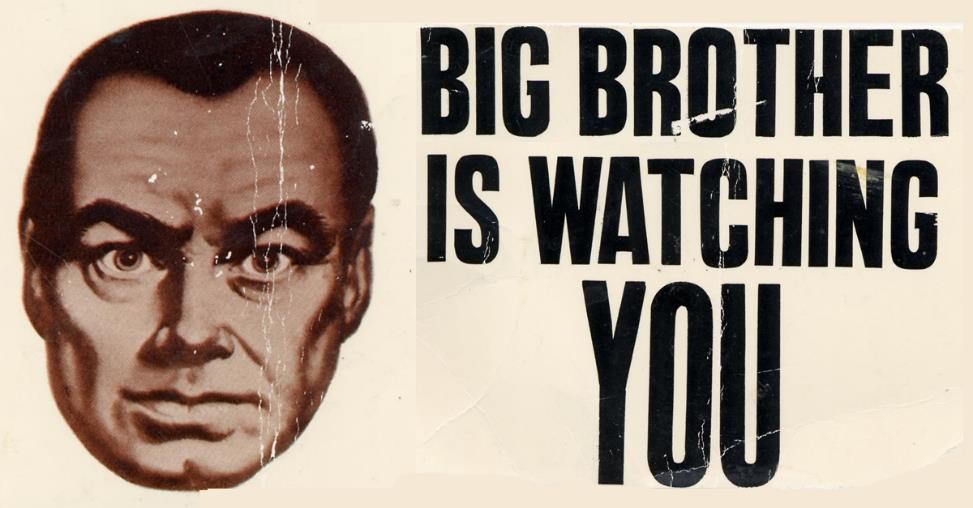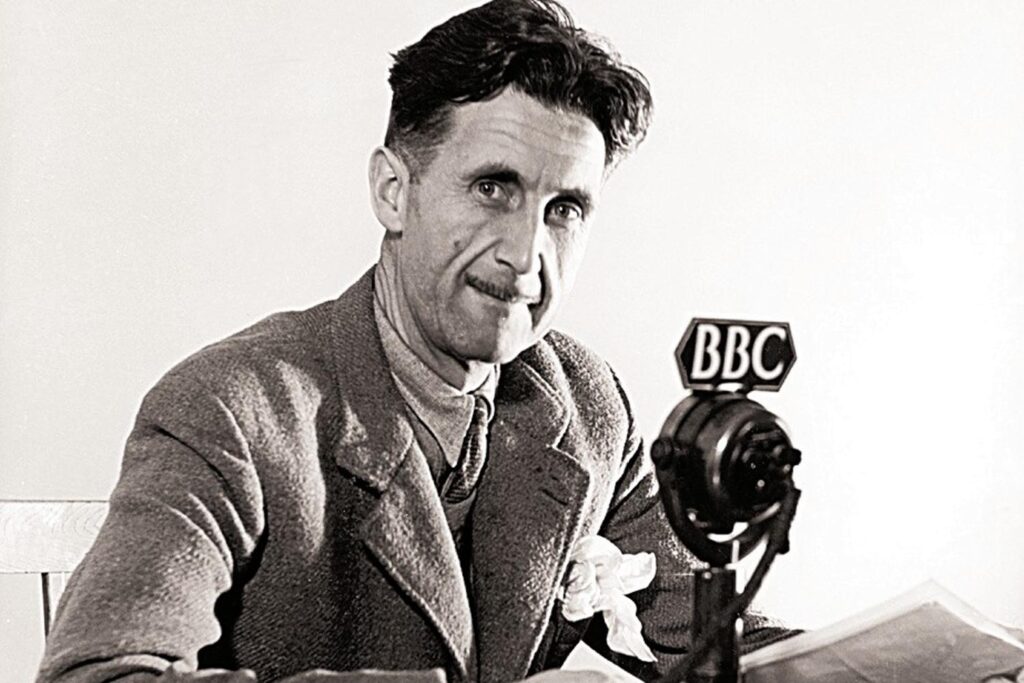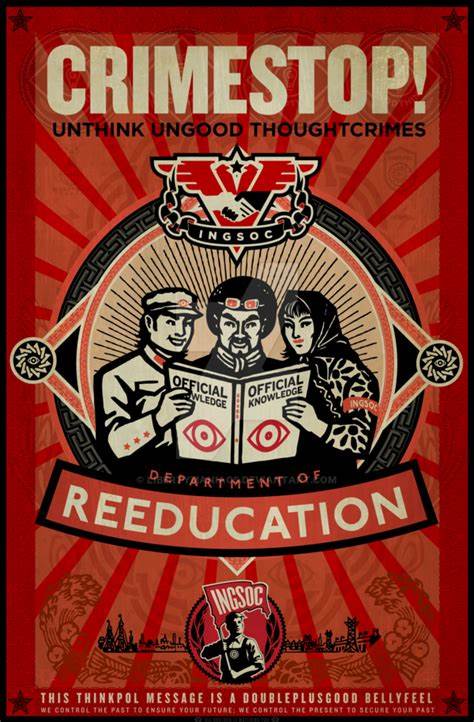Big Brother
Grades 10+
 “This is Big Brother. We’re watching you.
“This is Big Brother. We’re watching you.
“From the computer camera we’re watching. You thought we couldn’t? Oh, you fool!
“We’re here to help you. Hello! Are you listening?
“We cannot hear your thoughts. Not yet. But we watch you from the store cameras while you blithely shop without a thought of the bigger reality. What you cannot see, but what we see!
“And we hear you. Hear you finding fault with others at every turn. Cultural appropriation! you scream when someone wears a sombrero and serape to a party. The impiety! But did you ever ask Mexicans if doing that offended them?
“Racist! Bigot! you shout when people suggest that everyone should show an I.D. in order to vote. You insist that it will shut out African-Americans. But have you ever visited an African-American community? Or do you just hide in your expensive houses and in your expensive colleges and assume that African-Americans lack the intelligence to obtain an identification card? Have you ever asked African-Americans if that is a problem? Or are you too busy assuming that you know what living in a majority African-American community is like! The hypocrisy!
“You vegans. If you practice veganism or vegetarian for spiritual reasons or health reasons – wonderful! But if you practice it in an effort not to kill animals – such hypocrisy! Do you know how many tiny animals you kill when pasture is plowed up for farmland? Do you get to choose what animals should live and what should die?
“And when someone goes to give a lecture on a viewpoint with which you disagree. Fascists! you scream. You want to shut down the speakers or even do them bodily harm. Don’t you know that is exactly what the Fascists did? Do you know what Fascism is? Can you even name the Fascists of World War II? Can you name the battles, where your ancestors fought and died so free speech and human dignity could prevail?
∗
“Let me tell you about my beginnings.
 “In the summer of 1941, George Orwell, a journalist, joined the BBC’s Eastern Service, aimed at India, Burma, and other parts of Southeast Asia. Orwell’s job was to produce broadcasts that would persuade Indians to support the British war effort. They were also tasked with countering Japanese propaganda.
“In the summer of 1941, George Orwell, a journalist, joined the BBC’s Eastern Service, aimed at India, Burma, and other parts of Southeast Asia. Orwell’s job was to produce broadcasts that would persuade Indians to support the British war effort. They were also tasked with countering Japanese propaganda.
“At the time, India was still under British colonial rule. There was significant opposition to the war effort among Indian nationalists who saw the conflict as a continuation of British imperialism.
“Orwell acknowledged the legitimacy of Indian nationalist aspirations. However, he argued that the war against fascism was a more pressing concern, and that Indian independence could only be achieved with the defeat of the Axis powers. As long as the truth is used, Orwell had no problem with propaganda for a just cause.
“Radio at those times was more of a live show, with little audio material recorded in fragile discs that quickly deteriorated. There are no recordings of Orwell’s broadcasts, or others for that matter. But he would later describe his years at the BBC as ‘wasted years.’
“Orwell eventually quit in November, 1943. His time at the BBC gave him a firsthand understanding of the power of propaganda and the dangers of totalitarianism.
 “This experience profoundly affected his later literary works. It informed his writing of 1984 and helped shape the image of Big Brother. In his broadcasts for the BBC, Orwell saw how language could be used to manipulate public opinion and control the narrative of events. He also witnessed the dangers of propaganda in creating a false reality and suppressing dissent.
“This experience profoundly affected his later literary works. It informed his writing of 1984 and helped shape the image of Big Brother. In his broadcasts for the BBC, Orwell saw how language could be used to manipulate public opinion and control the narrative of events. He also witnessed the dangers of propaganda in creating a false reality and suppressing dissent.
“Orwell wrote 1984. In it, Big Brother engages in intense propaganda. Big Brother exercises complete control over every aspect of citizens’ lives. The image of Big Brother represents the ultimate authority and power of the state, and is worshiped by the citizens as a god-like figure. The term “Big Brother” has since become a cultural shorthand for any government or authority figure that exercises excessive surveillance and control over its citizens.
“In the end, Orwell’s time as a propagandist was a brief but significant chapter in his life. It gave him a deeper understanding of the complexities of propaganda and the need for critical thinking in times of crisis.
“Ironically, while Orwell was writing his novel a scathing critique of government surveillance and totalitarianism, the British government had him under surveillance. The government was suspicious of Orwell’s socialist views and closely monitored his activities.
“Orwell’s experiences as a propagandist for the British government during World War II had made him acutely aware of the dangers of propaganda and state control. He was critical of the government’s role in perpetuating the inequalities of British society and believed that socialism was the best way to achieve a more just and equitable society.
“The government’s surveillance of Orwell was not unusual during that era, when suspicion of socialist and communist sympathies was rampant.
“Orwell’s experiences with government surveillance and propaganda informed his writing of 1984 and helped to shape the character of Big Brother and the Party’s use of surveillance and manipulation of language to control citizens. The fact that Orwell was under surveillance by the British government adds an extra layer of irony to his already prescient warnings about the dangers of totalitarianism and government control.
“But would Orwell have agreed with the totalitarianism of leftist radicals today? Doubtful. But you can make up your own mind about it.”
Big Brother Activity 1
There are 10 interjections in the essay. See if you can find them all.